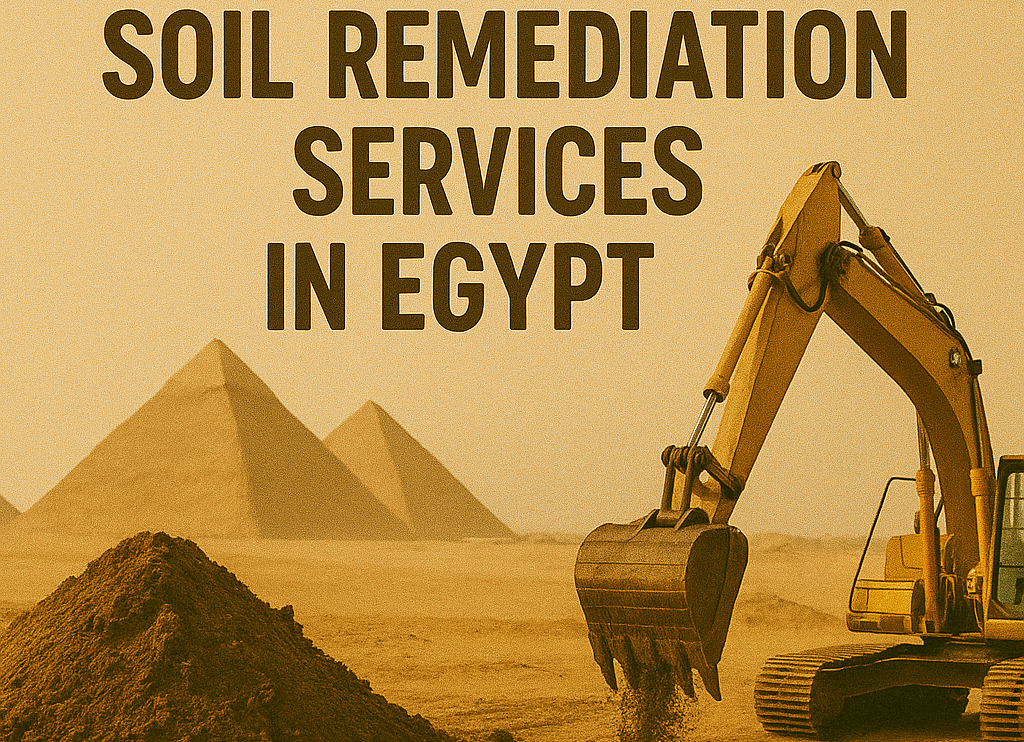Protecting Land and Water for Future Generations
Introduction
Egypt, shaped by the Nile and its fertile valley yet bordered by vast deserts, is facing an urgent environmental challenge: soil and groundwater contamination. With agriculture sustaining millions, alongside rapid industrial growth and urban expansion, the country’s fragile soil and water systems are under mounting pressure. Industrial waste along the Nile, oil and gas operations, and fertilizer overuse in the Delta have created widespread contamination risks that threaten food security, public health, and sustainable development.
At The Ground Water Company, we deliver specialized soil remediation services across Egypt. Our mission is to rehabilitate degraded land, protect aquifers, and support government bodies, industries, and communities in meeting environmental standards while advancing Egypt’s long-term sustainability agenda.
What Is Soil Remediation?
Soil remediation is the process of cleaning up and restoring contaminated soil to make it safe for people, plants, and animals. It’s commonly used at sites where industrial activities, chemical spills, or improper waste disposal have polluted the ground.
In Egypt, the most common soil contaminants include:
- Petroleum hydrocarbons – from oil refining, transport, and storage sites
- Heavy metals – linked to mining, industrial waste, and fertilizer runoff
- Chemical residues – from pesticides, fertilizers, and untreated industrial effluents
- Salinity and nitrates – caused by irrigation practices, seawater intrusion, and agricultural intensification in the Nile Delta
Soil Contamination Challenges in Egypt
Egypt’s geography and economy create distinct contamination pressures:
- Industrial & Energy Activities – Refineries, chemical plants, and oil operations contribute to hydrocarbon and chemical leaks.
- Urban Expansion – Cairo, Alexandria, and Suez generate mounting waste and landfill pressures, affecting soil and groundwater.
- Agricultural Stress – Fertilizer and pesticide overuse in the Nile Delta and Valley increase salinity and nitrate buildup.
- Water Scarcity – With the Nile as the lifeline, pollution of surrounding soils and aquifers creates risks far beyond localized areas.
- Coastal Vulnerability – Rising salinity and waste discharge threaten soil and water in coastal governorates.
Our Soil Remediation Services in Egypt
At GWC, we provide solutions tailored to Egypt’s environmental realities:
- Site Assessment & Soil Testing
Soil sampling and analysis to identify contaminants
Risk assessment for human health and environment
Geotechnical surveys to understand soil structure
- Excavation & Disposal
Removal of contaminated soil
Transport to licensed disposal facilities
Landfill management or off-site treatment
3.In-Situ Remediation Services
Bioremediation (using microbes or plants)
Chemical oxidation/reduction
Soil vapor extraction
Phytoremediation
4.Ex-Situ Remediation Services
Soil washing
Thermal desorption
Stabilization
5.Water Treatment
Pump and treat systems
Permeable reactive barriers
Containment systems
6.Monitoring & Reporting
Post-remediation soil testing
Environmental monitoring
Regulatory reporting and documentation
Why Soil Remediation Matters in Egypt
- Protects Groundwater Security – Safeguards aquifers and Nile-adjacent water supplies vital to millions
- Restores Agricultural Productivity – Ensures fertile soils in the Delta and Valley remain productive
- Supports National Goals – Aligns with Egypt’s Vision 2030 for environmental protection and sustainable growth
- Ensures Compliance – Meets Egyptian environmental laws and international standards
- Safeguards Public Health – Reduces risks of exposure to toxins and improves soil quality for farming and urban communities
Other Ground water Services We Provide in Egypt
Alongside soil remediation, GWC offers a full range of groundwater services:
- Ground water exploration
- Ground water recharge
- Ground water contamination
- Dewatering solutions
- Flooding solutions
- Hydrological studies
- Ground water seepage
- Ground water remediation
- Flood risk assessment
Conclusion
Egypt’s dependence on the Nile, combined with its rapid industrialization and population growth, makes soil and groundwater protection a national priority. Contamination is not just an environmental issue it directly affects food security, water availability, and public health.


